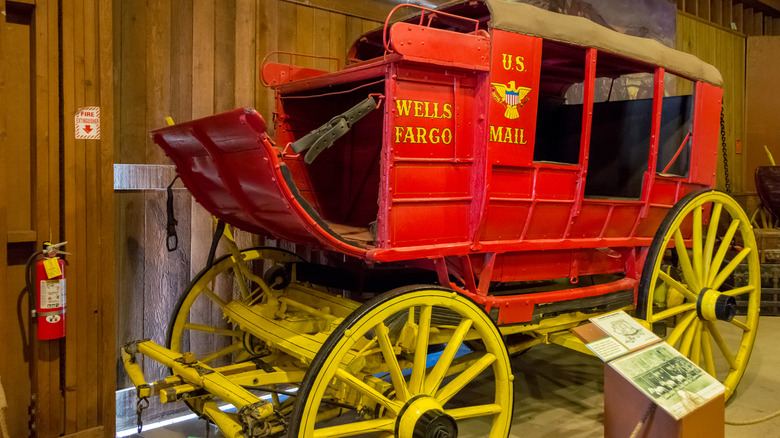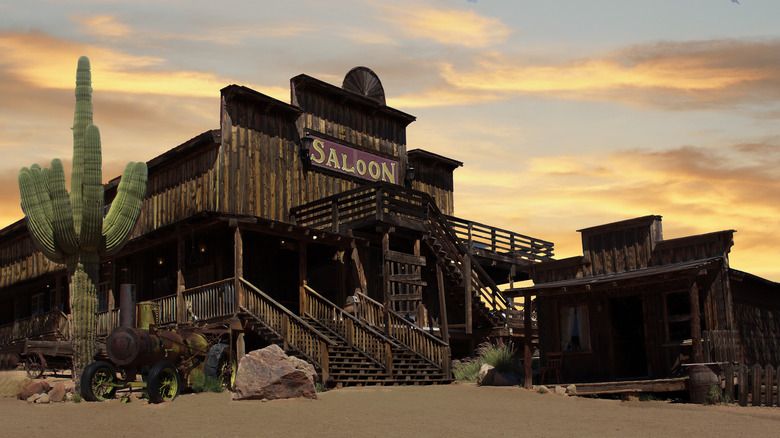This Was The Last Stagecoach Robbery In The Wild West
The last stagecoach robbery in the Old West resulted in the death of an innocent 33-year-old man, and introduced the first time a palm print became evidence in a U.S. court.
The Jarbidge Stage Robbery, named after the Nevada town in which it happened, only netted $4,000 (about $9,000 today) and a bag of silver coins when U.S. mail carrier Fred M. Searcy got ambushed on December 5, 1916, but it had lasting significance. While the crime is dubbed "the Old West's last stagecoach robbery," the New York Daily News pointed out that this is a misnomer, since technically Searcy's buggy, more like a buckboard, had two horses hooked to a wagon rather than a cab space that transported people — a mail stage, not a stagecoach.
The trip started badly, with Searcy leaving Rogerson, Idaho, during a blizzard. His 66-mile mail route took him to the gold-mining town of Jarbidge. When he didn't arrive, search parties combed the area and discovered his wagon and horses near a creek, with Searcy's body still in the driver's seat.
A murder in a small town
At first, the rescue crew thought he had frozen to death, according to Nevadagram. But with a closer look, they realized the mail carrier had been shot through his skull. An investigation found that locals had heard a shot and cries earlier that day. Some remembered seeing two unidentified men on a stage that same day in the area.
The following day, detectives discovered rummaged second-class mail sacks with letters scattered on the ground, along with human tracks and canine paw prints. A hunter recommended using a stray dog to follow the tracks, believing that an animal that already treaded that area might lead the group to something. One dog did, taking them to the first-class mail sacks where the investigation found a clue: a letter with a bloody palm print. Residents pinpointed local ruffian Ben Kuhl as a possible suspect, according to Linn's Stamp News. The police arrested him. Later, a bloody overcoat, a bandana and shirt were discovered in the river. Someone had weighed them down with stones. Then in Kuhl's residence a .44-caliber revolver was recovered.
Kuhl claimed he spent the day of the robbery in a local saloon, although no one corroborated the claim. Kuhl's two poker buddies, Billy McGraw and Edward Beck, also became suspects, with a local gambler claiming that the gun actually belonged to McGraw and that Beck borrowed it for Kuhl, according to the Daily News.
A lost treasure?
When Kul's trial started in September 1917, things didn't look good for the prosecution, since all the evidence seemed circumstantial. Fingerprinting analysis had just started to become a convincing tool during court cases, but a palm print had never been used before.
A specialist, C.H. Stone, testified that the Kuhl's hand matched the palm print, and jurors used a projectoscope, a moving pictures machine, to look at a comparison between the prints. After an 18-day trial, the jury found Kuhl guilty of first-degree murder, according to True West magazine. The judge initially sentenced him to death before Kuhl received a commuted sentence of life imprisonment.
Beck also received a life sentence, and was freed after serving six years. McGraw cut a deal, and got little jail time for testifying against Beck.
Kuhl was paroled in May 1945, according to an article posted by Nevada's Great Basin College; some believe the lost money waits to be found somewhere in Jarbidge. While Kuhl received several offers for a reduced sentence to give back the $4,000, he never revealed its whereabouts, according to Fox News radio. Maybe it's still out there in Jarbidge Canyon, waiting to be discovered.


